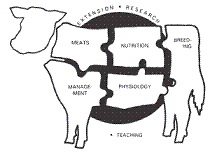Animal Science, Department of

Nebraska Beef Cattle Reports
Date of this Version
January 1998
Abstract
Calving difficulty altered the stress-related capabilities of the calf, placing the newborn in a compromised situation. Calves derived by severe mechanical pull or cesarean section exhibited depressed short-term defensive capabilities, lower cortisol and elevated neutrophil values, necessary for fighting infectious organisms. Of equal concern: when compared to calves born with little or no parturition difficulty, the stressed calves failed to develop effective adaptive mechanisms, having lower thyroid activity and lymphocyte values of principle importance for long-term survival. Neither the heifer’s mothering ability nor her disposition tended to influence her calf’s stress indicators.


Comments
Published in Nebraska Beef Cattle Report 1998, published by Agricultural Research Division, University of Nebraska Cooperative Extension, and Institute of Agriculture and Natural Resources, University of Nebraska–Lincoln.